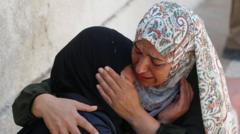The latest conflict between Israel and Iran erupted on Friday, following Israeli strikes on Iranian nuclear and military facilities. Reports indicate significant casualties on both sides, as tensions escalate with the potential for U.S. intervention.
Escalating Tensions: The Israel-Iran Conflict Intensifies

Escalating Tensions: The Israel-Iran Conflict Intensifies
As Israel and Iran engage in fierce exchanges of military strikes, the conflict raises concerns about broader implications, including potential U.S. involvement.
Article Text:
The long-standing rivalry between Israel and Iran has erupted once again, sparking a significant military conflict that began on Friday. Footage reveals an alarming exchange of attacks, with both nations engaged in retaliatory strikes that have left more than 220 people dead in Iran and 24 in Israel, according to official reports.
The confrontation saw its genesis in Israeli airstrikes targeting key military and nuclear sites in Iran, known as Operation Rising Lion. In response, Iran launched its own aerial attacks dubbed True Promise 3, aimed at various military and infrastructure targets in Israel.
Israeli Prime Minister Benjamin Netanyahu emphasized the necessity of the strikes, warning that Iran's advancing nuclear program poses an imminent threat. Meanwhile, Iranian officials condemned the Israeli actions as an act of war, vowing retribution. As missile exchanges increased in intensity, the situation has grown increasingly precarious, prompting U.S. President Donald Trump to contemplate direct involvement against Iran.
On the operational front, Israel’s attacks were concentrated on the Natanz nuclear facility and multiple military installations, claiming significant destruction of Iran's missile capabilities. The Iranian military asserted its ability to retaliate, striking Israeli cities, including a direct hit on Soroka hospital, injuring many civilians.
Trump's administration faces a critical crossroads as reports suggest possible U.S. support to Israel using advanced weaponry capable of penetrating Iranian fortified sites. This potential escalation has led to intensified discussions within his administration amid warnings from Iran's leadership of severe repercussions if the United States chooses to intervene.
The back-and-forth bombardment raises questions about each country's military capabilities and the broader implications for regional stability. Amid stalled diplomatic dialogues regarding Iran's nuclear ambitions, tensions have reached a boiling point, potentially leading to a prolonged conflict if not managed effectively.
Both nations remain entrenched in their positions, with Netanyahu assuring the continuation of military operations until the Iranian nuclear threat is neutralized, while Iran insists on its right to defend its territory and destroy what it views as aggressions.
As the world watches this volatile situation unfold, the geopolitical stakes are incredibly high, with the possibility of wider ramifications involving the U.S. and other global powers becoming increasingly likely. The coming days will be crucial in determining both the scope of military operations and efforts to seek a diplomatic resolution to this escalating conflict.
The long-standing rivalry between Israel and Iran has erupted once again, sparking a significant military conflict that began on Friday. Footage reveals an alarming exchange of attacks, with both nations engaged in retaliatory strikes that have left more than 220 people dead in Iran and 24 in Israel, according to official reports.
The confrontation saw its genesis in Israeli airstrikes targeting key military and nuclear sites in Iran, known as Operation Rising Lion. In response, Iran launched its own aerial attacks dubbed True Promise 3, aimed at various military and infrastructure targets in Israel.
Israeli Prime Minister Benjamin Netanyahu emphasized the necessity of the strikes, warning that Iran's advancing nuclear program poses an imminent threat. Meanwhile, Iranian officials condemned the Israeli actions as an act of war, vowing retribution. As missile exchanges increased in intensity, the situation has grown increasingly precarious, prompting U.S. President Donald Trump to contemplate direct involvement against Iran.
On the operational front, Israel’s attacks were concentrated on the Natanz nuclear facility and multiple military installations, claiming significant destruction of Iran's missile capabilities. The Iranian military asserted its ability to retaliate, striking Israeli cities, including a direct hit on Soroka hospital, injuring many civilians.
Trump's administration faces a critical crossroads as reports suggest possible U.S. support to Israel using advanced weaponry capable of penetrating Iranian fortified sites. This potential escalation has led to intensified discussions within his administration amid warnings from Iran's leadership of severe repercussions if the United States chooses to intervene.
The back-and-forth bombardment raises questions about each country's military capabilities and the broader implications for regional stability. Amid stalled diplomatic dialogues regarding Iran's nuclear ambitions, tensions have reached a boiling point, potentially leading to a prolonged conflict if not managed effectively.
Both nations remain entrenched in their positions, with Netanyahu assuring the continuation of military operations until the Iranian nuclear threat is neutralized, while Iran insists on its right to defend its territory and destroy what it views as aggressions.
As the world watches this volatile situation unfold, the geopolitical stakes are incredibly high, with the possibility of wider ramifications involving the U.S. and other global powers becoming increasingly likely. The coming days will be crucial in determining both the scope of military operations and efforts to seek a diplomatic resolution to this escalating conflict.





















